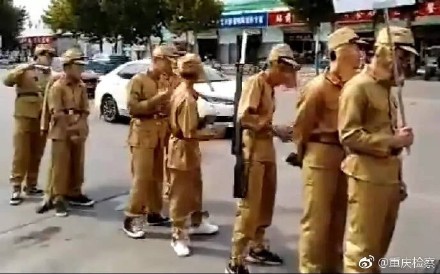Man detained for leading parade in Japanese uniform
 0 Comment(s)
0 Comment(s) Print
Print E-mail China Daily, October 10, 2018
E-mail China Daily, October 10, 2018
A man who led a parade of people dressed in imperial Japanese military uniforms around a bus station in Lianyungang, Jiangsu province, was put in criminal detention on Monday, local police said.

The police said the group of over 10 people was from a local film and television company, parading on Sunday to promote a comedy sponsored by the company.
Ganyu district, where the parade took place, is a revolutionary base area where many Chinese lost their lives during the War of Resistance Against Japanese Aggression (1931-45).
According to a video taken by passers-by that went viral, some in the parade were holding rifles and sabers while wearing caps and uniforms of the Imperial Japanese Army. They were laughing and joking as they performed the parade, under escort by others dressed in uniforms of the New Fourth Army, which was one of the main communist forces during the war.
Some held boards with the name of film, Japanese Invaders Entering Ganyu - a Comedy in Local Dialect, and the name of the film company.
Jiangsu police stopped the event immediately after the public reported the case. The group leader, surnamed Zhong, was detained, and the others are under investigation.
Local authorities said the video had adverse impacts on the public.
Such behavior is against the law and those involved are suspected of causing disturbances, the police said.
In February, two men posing for pictures dressed in imperial Japanese military uniforms in front of a Nanjing memorial site were detained for 15 days.
In August last year, five people were either held in administrative detention or given warnings by Shanghai police for doing the same in front of the historic Sihang Warehouse, which was used to repel the Japanese army in 1937.
These behaviors have provoked outrage among Chinese, with people commenting online that those challenging the dignity of the country should be severely punished.
Starting July last year, the State Administration of Cultural Heritage solicited public opinion on a document regarding the preservation and use of cultural relics relevant to the war, saying that all visitors to such sites should dress properly and remain silent to show respect.
The Supreme People's Court has stressed strict enforcement of a new law, which went into effect in May.
It stipulates that those who profane or deny the deeds and spirit of heroes and martyrs, and those who glorify wars or acts of invasion and disturb social order, can face criminal punishments.





